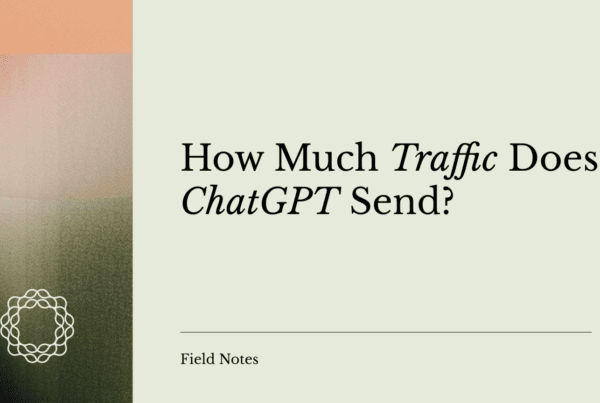
Why Google Cares About Site Experience
Google generates around 80% of its revenue from search ads. If people don’t use Google’s search engine, advertisers don’t flock to Google and purchase ad space. This means quality, relevancy, and accuracy throughout search results are a top priority.
To maintain a high standard, Google rolled out a set of quantitative metrics that allow it to index sites at scale. These metrics, collectively known as ranking factors, are a proxy for the experience a person has with a company’s website. In a way, Google has codified human behavior into its search engine.
Google keeps this list of ranking factors close to the chest to limit the power of bad actors. As a result, the majority of what we understand about its search engine has become known over two decades of testing by SEOs.
The perceived impact of brand authority on search rankings is the same. We don’t have an official statement from Google, but we do have some clear indications that help us make some safe bets.
How to Measure Brand Authority
Brand authority is the perception of your company as a trustworthy source of information. Higher brand authority indicates a trustworthy business, making it an ideal metric for Google to consider when indexing websites for quality.
If you’ve spent any time in content or SEO, you’re familiar with backlinks. The more links there are pointing to your site, the more Google trusts your domain. But backlinks don’t tell the full story. What about keywords? How does Google assign authority through the relationship between your branded terms and the non-branded terms most relevant to your product offering?
In a 2012 patent, Google’s engineers gave us insight into how they might calculate and weigh brand authority. The patent mentions a few concepts relevant to our branding discussion: express links, implied links, and reference queries.
- Express link: The traditional backlink. They’re those blue links you notice when you’re reading an article. It’s a clearly expressed link from one site to another that’s usually rooted in relevant anchor text.
- Reference query: A search term that mentions a brand name alongside a popular non-branded term.
- “[brand name] + project management software”
- “[brand name] + erp systems”
- “www.example.com + erp systems”
- Implied link: The connection made when a person uses a reference query. The link is implied because it’s not expressed through a traditional blue backlink. Instead, it’s a correlation made through a search query entered in Google.
While the filing of a patent doesn’t guarantee Google is using it in its search engine, the SEO community has clear evidence that it is. It’s highly likely that Google is taking note of every search that includes your branded term alongside traditional ranking factors like site experience and topical relevance.
I see this trend when I’m auditing a site’s keyword profile. The brands with the most authority and the strongest branded presence rank for numerous long-tail reference queries. Users clearly make an association between a brand and the keywords used to refer to a product category.
Simply put, the more frequently people search for your brand alongside your product category or industry, the more authority your brand (and domain) begins to carry in Google’s eyes.
How to Leverage Your Brand Authority
You came this far, so I owe you something actionable. What content marketing tactics increase your brand authority in SERPs?
- Define your brand. The first step is to have a brand voice. No, establishing a website does not give you a brand voice. No, publishing content does not give you a brand voice. If you find your internal teams disagreeing frequently on how to communicate your position to prospects, chances are you need to go through a branding exercise.
- Inject your brand voice throughout your content. SEO content can and must strike a balance between serving the SERP and communicating your brand voice. Work with a content partner that understands this.
- Invest in various types of written content. Diversify your content portfolio with thought leadership pieces, product guides, or data reports. This type of content gets much more mileage than SEO content. Your sales team will love using it in their ABM plays, and your link-building team will share it with a long list of publishers.
A unified brand voice opens the door to creating more impactful content that reaches outside of organic search. Suddenly, thought leadership pieces have more cohesion, product guides communicate the experience and not just features and blog content contains language specific to your target ICPs.
Take the time to define your brand, and you’ll watch it pay dividends. You’ll build an experience that, over time, will directly impact your performance in organic search.
Want more insights like this? Connect with me on LinkedIn.
Recommended Reads
- What Google I/O 2023 Reveals About the Future of SEO – Kevin Indig’s piece is crucial for any SEO that understands the AI-centric version of search will require a different approach.
- How the $500 Billion Attention Industry Works (Podcast) – Ezra Klein and Tim Hwang discuss how the digital ad industry has shaped our obsession with human attention, how we measure it, and the impact it’s had on the content we produce.
- Domain Modeling the BBC w/Mike Atherton – Omniscient uses a version of Mike’s process to structure our client’s content program. More on this in another edition of Field Notes.


